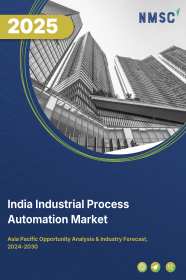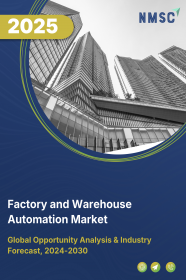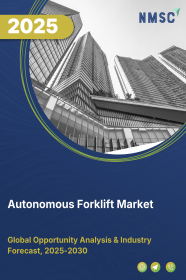
India Industrial Process Automation Market by Component {MES (Hardware, Software, Services); DCS (Hardware, Software, Services); PLC (Hardware, Software, Services); SCADA (Hardware, Software, Services); Field Instruments; Industrial Robots; Human Machine Interface; Industrial PCs; Process Analyzers & Drives} and by End User (Oil & Gas, Chemicals & Refining, Energy & Power, Pulp & Paper, Metals & Mining, Pharma, & Others) – Global Opportunity Analysis and Industry Forecast, 2025–2030
Industry: Semiconductor & Electronics | Publish Date: 31-Oct-2025 | No of Pages: 160 | No. of Tables: 121 | No. of Figures: 66 | Format: PDF | Report Code : SE998
Industry Outlook
The India Industrial Process Automation Market size was valued at USD 2.36 billion in 2024 and is projected to grow to USD 2.64 billion by 2025. Additionally, the industry is expected to continue its growth trajectory, reaching USD 4.07 billion by 2030, at a CAGR of 9.50% from 2025 to 2030.
The Indian government's investment in digital infrastructure, with a budget of USD 20.03 billion for the Digital India initiative, is accelerating the adoption of industrial process automation technologies across various sectors. The chemical industry's growth, with India being the 6th largest producer of chemicals globally, further drives automation adoption to improve operational efficiency, safety, and product consistency. However, the high initial investment costs present a significant restraint, especially for small and medium-sized enterprises, limiting the market's expansion. The integration of AI and ML offers substantial growth potential, enabling predictive maintenance, real-time decision-making, and optimized workflows, positioning India to lead in intelligent automation solutions and driving long-term market growth
Investment in Digital Infrastructure Accelerates the India Industrial Process Automation Market Growth
The Indian government's significant investment in digital infrastructure is driving the growth of the India industrial process automation market. The adoption of technologies such as the Internet of Things (IoT), cloud computing, and artificial intelligence (AI) is increasingly enabling industries to optimize operations, enhance efficiency, and reduce costs. According to a report from Invest India published in February 2024, the government has extended a budget of USD 20.03 billion for the Digital India initiative, which spans from 2021-2022 to 2025-2026. This sustained funding in digital infrastructure is fueling the widespread adoption of automation technologies, driving efficiency, innovation, and technological transformation across various sectors of the economy.
Growth of the Chemical Industry Fuels Automation Adoption
The growth of India’s chemical industry is significantly contributing to the demand for industrial process automation. With the increasing need for precise process control, improved safety standards, and higher operational efficiency in chemical production, automation technologies have become essential. According to the Ministry of Commerce and Industry’s latest report in August 2025, India is the 6th largest producer of chemicals globally and the 3rd largest in Asia, contributing 7% to the country’s GDP. This robust growth highlights the sector’s shift toward automation to optimize production processes, improve safety, and drive market expansion. As the chemical industry continues to grow, automation plays a key role in enhancing efficiency and ensuring product consistency, meeting both domestic and global market demands.
High Initial Investment Costs Restrain the India Industrial Process Automation Market Expansion
Despite the increasing adoption of automation technologies, the high initial investment costs remain a major barrier to the growth of the industrial process automation market in India. Small and medium-sized businesses, in particular, face significant challenges in securing the capital needed for equipment and system integration. These financial barriers hinder the widespread adoption of automation solutions, especially among companies that not have the resources to invest in large-scale digital transformation initiatives. As a result, high upfront costs limit the overall pace of market growth and slow the adoption of automation technologies in the country.
AI and ML Integration Unlocks Future Growth in Industrial Process Automation
The integration of artificial intelligence (AI) and machine learning (ML) presents a significant opportunity for India industrial process automation market. These technologies enable predictive maintenance, streamline production workflows, and improve real-time decision-making, all with minimal human intervention. By enhancing operational efficiency and reducing downtime, AI and ML drive greater productivity and enable companies to optimize production processes. As adoption of these technologies continues to grow, they further enhance the capabilities of automation systems, driving long-term market growth and positioning India as a leader in intelligent automation solutions.
Competitive Landscape
The promising players operating in market include Siemens AG, ABB Ltd., Schneider Electric India, Honeywell Automation India Limited, Emerson Electric Co., Rockwell Automation, Inc., Yokogawa Electric Corporation, Mitsubishi Electric Corporation, Endress+Hauser Group, Bharat Heavy Electricals Limited, GE Vernova, KROHNE Group, Fuji Electric Co., Ltd., Azbil Corporation, and Eaton Corporation, and others.
India Industrial Process Automation Market Key Segments
By Component
-
Manufacturing Execution Systems (MES)
-
Hardware
-
Software
-
Services
-
-
Distributed Control Systems (DCS)
-
Hardware
-
Software
-
Services
-
-
Programmable Logic Control (PLC)
-
Hardware
-
Software
-
Services
-
-
Supervisory Control and Data Acquisition (SCADA)
-
Hardware
-
Software
-
Services
-
-
Field Instruments
-
Industrial Robots
-
Human Machine Interface (HMI)
-
Industrial PCs
-
Process Analyzers and Drives
By End User
-
Oil and Gas
-
Chemicals and Refining
-
Energy and Power
-
Pulp and Paper
-
Metals and Mining
-
Pharma
-
Cement & Glass
-
Others
Key Players
-
Siemens AG
-
ABB Ltd.
-
Schneider Electric India
-
Rockwell Automation, Inc.
-
Yokogawa Electric Corporation
-
Mitsubishi Electric Corporation
-
Endress+Hauser AG
-
Bharat Heavy Electricals Limited
-
GE Vernova
-
KROHNE Group
-
Fuji Electric Co., Ltd.
-
Azbil Corporation
-
Eaton Corporation
Report Scope and Segmentation
|
Parameters |
Details |
|
Market Size Value in 2025 |
USD 2.64 billion |
|
Revenue Forecast in 2030 |
USD 4.07 billion |
|
Value Growth Rate |
CAGR of 9.50% from 2025 to 2030 |
|
Analysis Period |
2024–2030 |
|
Base Year Considered |
2024 |
|
Forecast Period |
2025–2030 |
|
Market Size Estimation |
Billion (USD) |
|
Growth Factors |
|
|
Companies Profiled |
15 |
|
Market Share |
Available for 10 companies |
|
Customization Scope |
Free customization (equivalent to up to 80 working hours of analysts) after purchase. Addition or alteration to country, regional, and segment scope. |
|
Pricing and Purchase Options |
Avail customized purchase options to meet your exact research needs. |

















 Speak to Our Analyst
Speak to Our Analyst
























